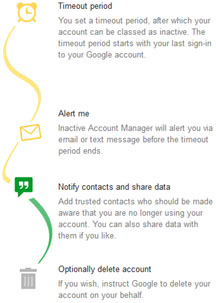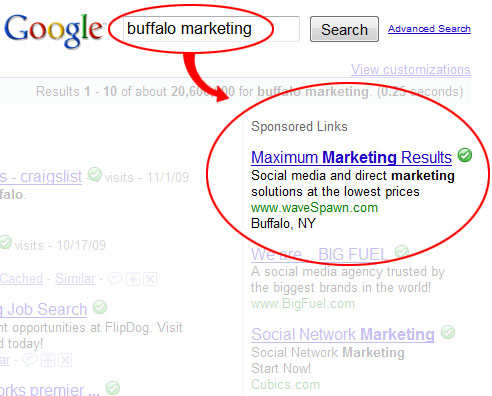Preparing for the digital afterlife with Google Inactive Account Manager
 Ever wondered what happens with someone’s email data, personal information, social media accounts and profiles after their death?
Ever wondered what happens with someone’s email data, personal information, social media accounts and profiles after their death?
Google recently tackled the subject of the “digital afterlife” with the launch of a service that will allow users to designate how they want their accounts handled after they die. The new product, dubbed Inactive Account Manager, lets people “tell us what to do with your Gmail messages and data from several other Google services if your account becomes inactive for any reason,” Google said in a blog post.
“For example, you can choose to have your data deleted — after three, six, nine or 12 months of inactivity. Or you can select trusted contacts to receive data from some or all of the following services: +1s; Blogger; Contacts and Circles; Drive; Gmail; Google+ Profiles, Pages and Streams; Picasa Web Albums; Google Voice and YouTube. Before our systems take any action, we’ll first warn you by sending a text message to your cell phone and email to the secondary address you’ve provided.”
It’s not the most pleasant topic to discuss, but it’s helpful to know that you can take proactive steps to plan for your Google data to be transferred or purged after your death. Other social networking sites like Facebook and Twitter have their own procedures for dealing with deceased users’ data, some third-party services have also offered to fill that need. Online storage site SecureSafe, for one, allows users to assign certain files to beneficiaries.


 After an antitrust investigation by the FTC and increasing competition from other mobile devices (such as Google’s Android), Apple
After an antitrust investigation by the FTC and increasing competition from other mobile devices (such as Google’s Android), Apple  I’ve been an avid user of Gmail for the past six years. Yesterday I was reading all about Google Buzz and their attempt to succeed in the social media frenzy. Sure enough when I logged into my Gmail account, I saw the “Buzz” icon right below my inbox… so naturally I clicked on it. Wow, I already have several people following me and following several people. Apparently, I’m connected with everyone in my address book. Since Google Buzz integrates with Gmail without the need for users to sign up, Google instantly added 176 million users to their social network platform… not too shabby of a start.
I’ve been an avid user of Gmail for the past six years. Yesterday I was reading all about Google Buzz and their attempt to succeed in the social media frenzy. Sure enough when I logged into my Gmail account, I saw the “Buzz” icon right below my inbox… so naturally I clicked on it. Wow, I already have several people following me and following several people. Apparently, I’m connected with everyone in my address book. Since Google Buzz integrates with Gmail without the need for users to sign up, Google instantly added 176 million users to their social network platform… not too shabby of a start. Targeted keyword sponsorship allows a business to buy the rights to a highly relevant keyword or phrase. Every time someone searches for that word or phrase, the sponsor’s listing appears as a highlighted text link at the top of the Search Engine Results Page (SERP). This type of marketing is rather expensive – thousands of dollars a month for the most popular phrases – because you pay to be listed whether or not your listing is clicked. This technique is frequently used by large companies for corporate branding and new product introductions.
Targeted keyword sponsorship allows a business to buy the rights to a highly relevant keyword or phrase. Every time someone searches for that word or phrase, the sponsor’s listing appears as a highlighted text link at the top of the Search Engine Results Page (SERP). This type of marketing is rather expensive – thousands of dollars a month for the most popular phrases – because you pay to be listed whether or not your listing is clicked. This technique is frequently used by large companies for corporate branding and new product introductions.